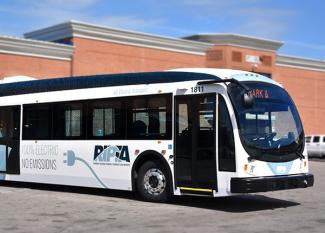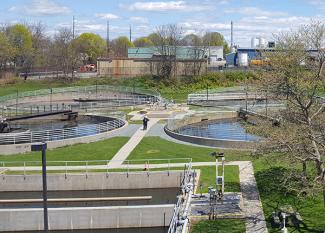SpotLight

SPOTLIGHT: CLEAN TRANSPORTATION
RIPTA Buses Equipped With Solar Panels
RIPTA buses are now receiving a little boost from sun! Most riders won’t notice it from where they are standing, but RIPTA has installed solar panels on all 33 of its 2019 diesel fleet. While the solar panels are not designed to make the buses go, they help power many of the vehicles’ auxiliary systems, such as ignition, GPS, automated stop announcements and lighting. This in turn reduces strain on the battery and can keep these systems live even when the engine is not running. Over the lifetime of the bus, the solar panels are expected to extend the life of the alternator, a vital engine component necessary for generating electricity. eNow Inc. supplied the 310-watt solar auxiliary panels and panel systems. The pilot project was funded in part by the Rhode Island Commerce Corporation which contributed a renewable energy grant of $42,800 that covered about two thirds of the cost. This is not RIPTA’s only foray into clean energy. In 2018, it leased three electric buses for testing and plans to purchase several more in upcoming years. Learn more

SPOTLIGHT: PROTECTED LANDS
Urban Forests for Climate and Health
The American Forests led Urban Forests for Climate and Health initiative originated from the Resilient Rhody strategy and will create a suite of tools that Rhode Island municipalities can use to help identify planting locations that maximize public health and climate mitigation potential. The initiative is focused on helping Rhode Island reach its carbon sequestration goals through urban tree planting while providing policy, funding, and implementation technical assistance. Rhode Island is a two-year, statewide demonstration of a national initiative on Natural and Working Lands funded by the Doris Duke Charitable Foundation.

SPOTLIGHT: RESILIENT COMMUNITIES
City of Newport Wastewater Treatment Facility Resilience Upgrades
The City of Newport is implementing a series of improvements to the Newport Water Pollution Control Plant. These upgrades are intended to address wet weather flows and mitigate combined sewer overflows (CSOs), which are a substantial source of water pollution. Among the upgrades made to the facility are an increase in the capacity that it can treat to better handle wet weather events, chemically-enhanced primary treatment, biofilters and improved solids management to minimize odors and a UV disinfection system to protect against the escape of bacteria. Additionally, the City is financing for solar panels that will provide a portion of the facility’s electricity and energy efficiency measures will reduce the amount of energy that the facility requires to operate.